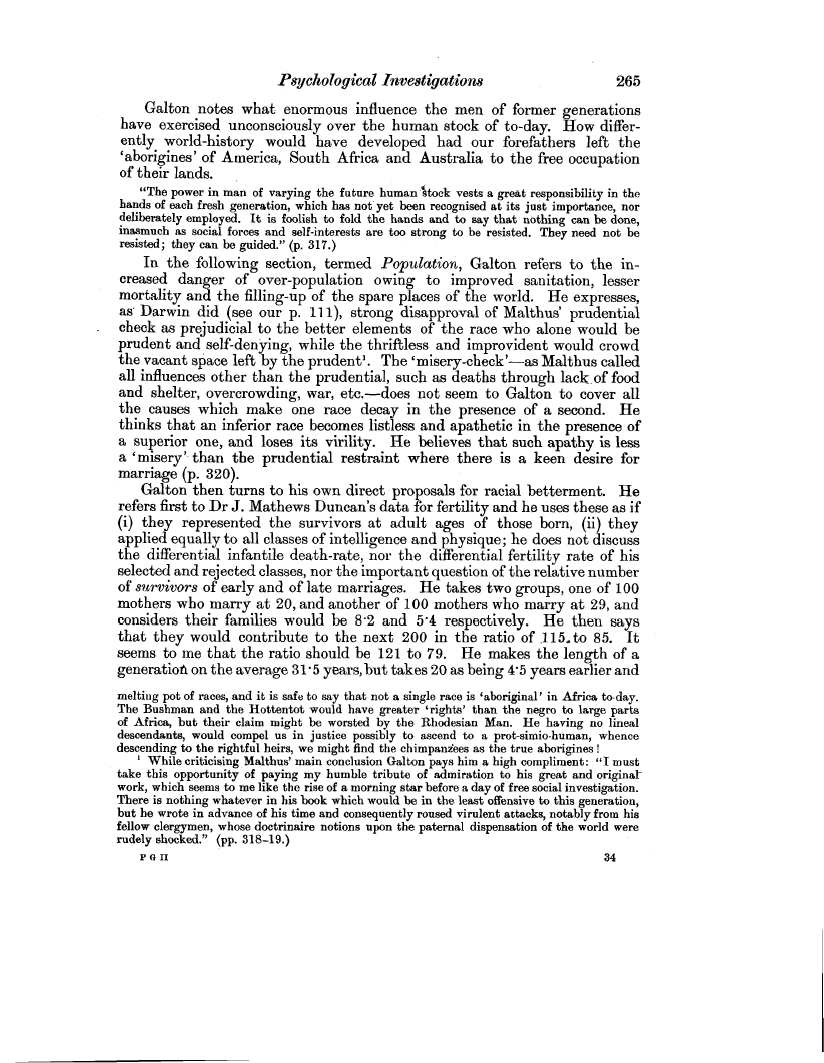Psychological Investigations 265
Galton notes what enormous influence the men of former generations have exercised unconsciously over the human stock of to-day. How differently world-history would have developed had our forefathers left the `aborigines' of America, South Africa and Australia to the free occupation of their lands.
"The power in man of varying the future human stock vests a great responsibility in the hands of each fresh generation, which has not'yet been recognised at its just importance, nor deliberately employed. It is foolish to fold the hands and to say that nothing can be done, inasmuch as social forces and self-interests are too strong to be resisted. They need not be resisted; they can be guided." (p. 317.)
In the following section, termed Population, Galton refers to the increased danger of over-population owing to improved sanitation, lesser mortality and the filling-up of the spare places of the world. He expresses, as Darwin did (see our p. 111), strong disapproval of Malthus' prudential check as prejudicial to the better elements of the race who alone would be prudent and self-denying, while the thriftless and improvident would crowd the vacant space left by the prudent'. The `misery-check'-as Malthus called all influences other than the prudential, such as deaths through lack-of food and shelter, overcrowding, war, etc.-does not seem to Galton to cover all the causes which make one race decay in the presence of a second. He thinks that an inferior race becomes listless and apathetic in the presence of a superior one, and loses its virility. He believes that such apathy is less
a `misery' than the prudential restraint where there is a keen desire for marriage (p. 320).
Galton then turns to his own direct proposals for racial betterment. He refers first to Dr J. Mathews Duncan's data for fertility and he uses these as if (i) they represented the survivors at adult ages of those born, (ii) they applied equally to all classes of intelligence and physique; he does not discuss the differential infantile death-rate, nor the differential fertility rate of his selected and rejected classes, nor the important question of the relative number of survivors of early and of late marriages. He takes two groups, one of 100 mothers who marry at 20, and another of 100 mothers who marry at 29, and considers their families would be 8-2 and 5.4 respectively. He then says that they would contribute to the next 200 in the ratio of 115. to 85. It seems to me that the ratio should be 121 to 79. He makes the length of a generatiod on the average 31.5 years, but takes 20 as being 4.5 years earlier and
melting pot of races, and it is safe to say that not a single race is `aboriginal' in Africa to-day. The Bushman and the Hottentot would have greater 'rights' than the negro to large parts of Africa, but their claim might be worsted by the Rhodesian Man. He having no lineal descendants, would compel us in justice possibly to ascend to a prot-simio-human, whence descending to the rightful heirs, we might find the chimpanzees as the true aborigines !
' While criticising Malthus' main conclusion Galton pays him a high compliment: "I must take this opportunity of paying my humble tribute of admiration to his great and originalwork, which seems to me like the rise of a morning star before a day of free social investigation. There is nothing whatever in his book which would be in the least offensive to this generation, but he wrote in advance of his time and consequently roused virulent attacks, notably from his fellow clergymen, whose doctrinaire notions upon the paternal dispensation of the world were
rudely shocked." (pp. 318-19.)
Pot 34

